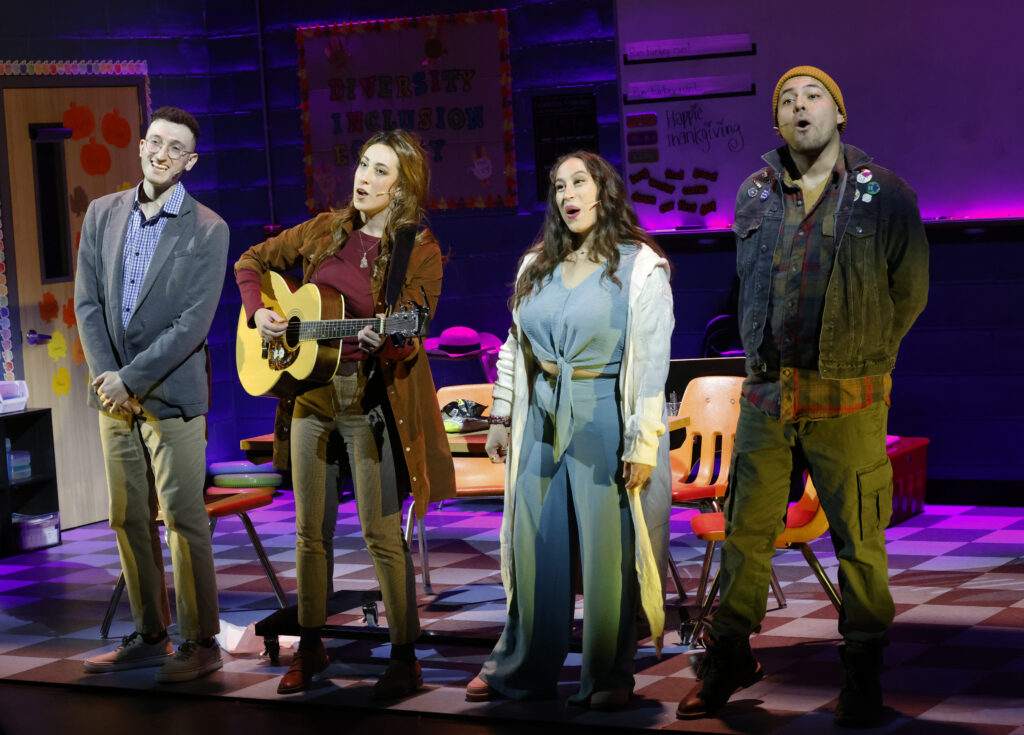
By Michele Markarian
“The Thanksgiving Play” by Larissa Fasthorse. Directed by Tara Moses. Presented by Moonbox Productions, One Arrow Street, Cambridge, through December 15.
“The Thanksgiving Play,” the author of whom is the first Native woman to be produced on Broadway, is the perfect satire for the times. A well-intentioned white couple, Logan and Jaxton (Jasmine Goodspeed and Johnny Gordon, respectively), are planning on writing and staging a Thanksgiving play for an elementary school, which will hopefully defy all of the awful, Native-canceling and falsehoods traditionally associated with the holiday and present a more truthful history. Logan has even gone so far as to hire a woman who she thinks is a Native actress, Alicia (Marisa Diamond) to help with script development. A starstruck teacher from another school, Caden (Ohad Ashkenazi), has volunteered to join the project, as he is impressed with the marginal credentials of Logan and Jaxton and considers it a privilege to work with them. Despite their good intentions, the four characters can’t conceal their cultural biases or the fact that none of them have any clue on how to think outside their own privilege. The satire lies in their earnestness and their frustration with the burgeoning knowledge that they really don’t – and can’t – get it. The action is punctuated by the actors, as children, singing culturally insensitive Thanksgiving songs that Fasthorse culled from real sources.
The characters are so embarrassingly recognizable. Jaxton gives Logan a gift, a glass jar that she’s dismissive of until she learns that it’s “made with recycled glass from broken windows in housing projects,” and it takes on new significance. They refer to themselves as enlightened white allies, although, as Jaxton declares, “I’m a straight white male – it’s an endless minefield.” Logan, in particular, is patronizing, citing her six weeks of trying to make it as an actor in Los Angeles as a qualifier for insider knowledge of the industry. While I’ve seen the play performed in a few different cities, I am sharply reminded of the one I live in, which happens to be Cambridge.
In this production, the four actors stand out of character and stretch in front of Baron E. Pugh’s marvelous set, which recreates an elementary school classroom with meticulous detail, and talk amongst themselves. At some prescribed point, it’s time to start to show, and they remove themselves from what they’re doing to be the characters they’re portraying – Goodspeed dons a wig – and the cast moves either offstage or into the set. It’s a little off-putting and doesn’t really prepare us for the reality of the piece. While Moses has admirably assembled a cast of Native actors and actors of color, the general attitude seems to be “We are portraying awful people we don’t like” (at one point, Goodspeed winks at the audience when she tells us she doesn’t know any Native Americans). As an audience member, it’s insulting. We don’t need to be told by the director that the people in the play are clueless and horrible – Fasthorse has already done that. In her notes, Moses admits that the play is deeply troubling to her as a brown-skinned Native person and that she was traumatized while watching it on Broadway. I get it, so why do this particular piece? Satire only works if it’s played straight and with sincerity. The actors portraying the characters must truly believe that they are doing the right thing and not perform in such a broad manner to let us know that yes! We, the actors and the director, think this play and its characters are terrible, and we hate them! Listen to this ridiculous line I’m going to say! It does not make for a compelling ninety minutes and only serves to remove us from Fasthorse’s pointed and well-targeted satire, which deserves better than this production offers. For more information and tickets, go to: https://moonboxproductions.org

